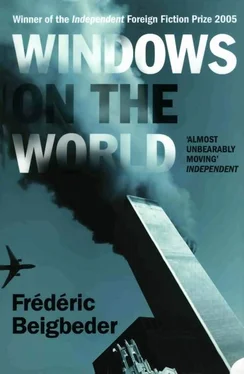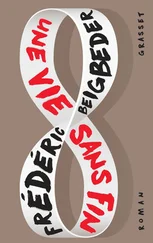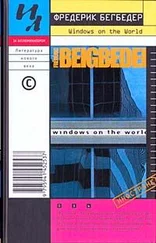Pressing their faces up against the glass, the kids try to scare each other.
“Scaredy-cat, scaredy-cat—can’t even look down with your hands behind your back.”
“Wow, this is weird!”
“You’re just chicken!”
I tell them that in 1974, a Frenchman called Philippe Petit, a tightrope walker, illegally stretched a cable between the Twin Towers at exactly this height and walked across in spite of the cold and the wind and the vertigo. “What’s a Frenchman?” the kids ask. I explain that France is a small European country that helped America to free itself from the yoke of English oppression between 1776 and 1783 and that, to show our appreciation, our soldiers liberated them from the Nazis in 1944. (I’m simplifying, obviously, for educational purposes.)
“See over there—the Statue of Liberty? That was a gift to America from France. Okay, it’s a bit kitsch, but it’s the thought that counts.”
The kids don’t give a damn, even though they’re big fans of “French fries” and “French toast.” Right now, I’m more interested in “French kissing” and “French letters.” And The French Connection, with the famous car chase under the L.
Through the Windows on the World, the city stretches out like a huge checkerboard, all the right angles, the perpendicular cubes, the adjoining squares, the intersecting rectangles, the parallel lines, the network of ridges, a whole artificial geometry in gray, black, and white, the avenues taking off like flight paths, the cross streets which look as though they’ve been drawn on with marker, tunnels like red-brick gopher holes; from here, the smear of wet asphalt behind the cleaning trucks looks like the slime left by an aluminum slug on a piece of plywood.
I often go and stand before the marble plaque at 56 Rue Jacob. All American tourists should make a pilgrimage to 56 Rue Jacob, instead of having their photo taken in front of the tunnel at Pont de I’Alma in memory of Diana and Dodi. It was here, on September 3, 1783, at the Hôtel d’York that the Treaty of Paris was signed by John Adams and Benjamin Franklin, putting an end to the War of Independence with the British. My mother lives nearby; a little farther up, hidden behind a tree, are the publishers Le Seuil. People cross the road in front of this old building without realizing that it was here, a stone’s throw from the Café de Flore, that the United States of America was born. Perhaps they prefer to forget.
Le Ciel de Paris at 8:34 AM. The luxury of skyscrapers is that they allow human beings to rise above themselves. Every skyscraper is a utopia. The age-old fantasy of man has been to build his own mountains. In building towers into the clouds, man is proving to himself that he is above nature. And that’s exactly how you feel at the top of one of these rockets of concrete and aluminum, glass, and steel: everything I can see belongs to me, no more traffic jams, gutters, sidewalks, I am man above the world. It is not the thrill of power, but of pride. There is nothing arrogant about it. Simply the joy of knowing that one can raise oneself higher than the tallest tree and:
You vapors, I think I have risen with you, moved away to distant continents, and fallen down there, for reasons,
I think I have blown with you you winds;
You waters I have finger’d every shore with you,
I have run through what any river or strait of the globe has run through,
I have taken my stand on the bases of peninsulas and on the high embedded rocks, to cry thence: Salut au monde!
What cities the light or warmth penetrates I penetrate those cities myself.
All islands to which birds wing their way I wing my way myself.
Toward you all, in America’s name,
I raise high the perpendicular hand, I make the signal,
To remain after me in sight forever,
For all the haunts and homes of men.
The title of Whitman’s poem is “Salut au Monde!”. In the nineteenth century, American poets spoke French. I am writing this book because I’m sick of bigoted anti-Americanism. My favorite French philosopher is Patrick Juvet: “I Love America.” Since war has been declared between France and the United States, you have to be careful when choosing sides if you don’t want to wind up being fleeced later.
My favorite writers are American: Walt Whitman and therefore, but in his own right, Edgar Allan Poe, Herman Melville, F. Scott Fitzgerald, Ernest Hemingway, John Fante, Jack Kerouac, Henry Miller, J. D. Salinger, Truman Capote, Charles Bukowski, Lester Bangs, Philip K. Dick, William T. Vollmann, Hunter S. Thompson, Bret Easton Ellis, Chuck Palahniuk, Philip Roth, Hubert Selby Jr., Jerome Charyn (who lives in Montparnasse), Jay McInerney (whom I met in Paris).
My favorite musicians are American: Frank Sinatra, Chuck Berry, Bob Dylan, Leonard Bernstein, Burt Bacharach, James Brown, Chet Baker, Brian Wilson, Johnny Cash, Stevie Wonder, Paul Simon, Lou Reed, Randy Newman, Michael Stipe, Billy Corgan, Kurt Cobain.
My favorite film directors are American: Howard Hawks, Orson Welles, Robert Altman, Blake Edwards, Stanley Kubrick, John Cassavetes, Martin Scorsese, Woody Allen, David Lynch, Russ Meyer, Sam Raimi, Paul Thomas Anderson, Larry Clark, David Fincher, M. Night Shyamalan.
American culture dominates the planet not for economic reasons, but because of its quality. It’s too easy to ascribe its influence to political machination, to compare Disney to Hitler or Spielberg to Satan. American art is constantly renewing itself, because it is profoundly rooted in real life. American artists are constantly searching for something new, but something new which speaks to us of ourselves. They know how to reconcile imagination and accessibility, originality with the desire to seduce. Molière was in it for the money, Mozart wanted to be famous: there’s nothing shameful about that. American artists churn out fewer theories than their European counterparts, because they haven’t got time, they’re too busy with the practice. They seize the world, grapple with it and, in describing it, they transform it. American authors think of themselves as realists when in fact they’re all Marxists! They’re hypercritical of their own country. No democracy in the world is as contested by its own literature. American independent and underground cinema is the most subversive in the world. When they dream, American artists take the rest of the world with them, because they are more courageous, more hardworking and because they dare to mock their own country. Many people believe that European artists have a superiority complex when it comes to their American counterparts, but they’re mistaken: they have an inferiority complex. Anti-Americanism is in large part jealousy and unrequited love. Deep down, the rest of the world admires American art and resents the United States for not returning the favor. A compelling example? Bernard Pivot’s reaction to James Lipton (presenter of the program The Actor’s Studio) on the last Bouillon de Culture. The host of the finest literary program in the history of French television seemed completely intimidated by Lipton, a pompous, toadying hack who chairs sycophantic discussions with Hollywood actors on some minor-league cable channel. Pivot, who created Apostrophes, a man who has interviewed the finest writers of his generation, couldn’t get over the fact that he was quoted in the States by a sycophantic creep.
What bothers us is not American imperialism, but American chauvinism, its cultural isolation, its complete lack of any curiosity about foreign work (except in New York and San Francisco). France has the same relationship with the United States nowadays as the provinces do with Paris: a combination of admiration and contempt, a longing to be part of it and a pride at resisting. We want to know everything about them so that we can shrug our shoulders with a condescending air. We want to know the latest trends, the places to be seen, all the New York gossip so that we can emphasize how rooted we are in the profound reality of our own country. Americans seem to have made the opposite journey to that of Europe: their inferiority complex (being a nouveau riche, adolescent country whose history and culture have, for the most part, been imported) has developed into a superiority complex (lessons in expertise and efficiency, cultural xenophobia, corporate contempt, and advertising overkill).
Читать дальше












